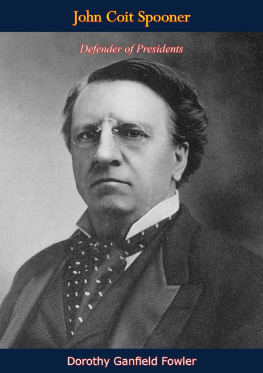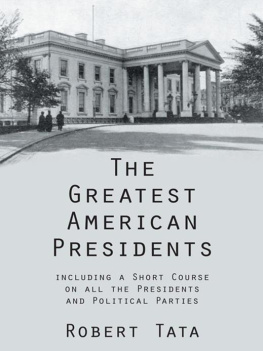

This edition is published by Papamoa Press www.pp-publishing.com
To join our mailing list for new titles or for issues with our books papamoapress@gmail.com
Or on Facebook
Text originally published in 1961 under the same title.
Papamoa Press 2018, all rights reserved. No part of this publication may be reproduced, stored in a retrieval system or transmitted by any means, electrical, mechanical or otherwise without the written permission of the copyright holder.
Publishers Note
Although in most cases we have retained the Authors original spelling and grammar to authentically reproduce the work of the Author and the original intent of such material, some additional notes and clarifications have been added for the modern readers benefit.
We have also made every effort to include all maps and illustrations of the original edition the limitations of formatting do not allow of including larger maps, we will upload as many of these maps as possible.
JOHN COIT SPOONER
Defender of Presidents
By
Dorothy Ganfield Fowler


DEDICATION
TO MY MOTHER
Mrs. William Arthur Ganfield
PREFACE
IN 1957 a committee of United States senators selected a Wisconsin senator as one of the five outstanding senators in American history. The one chosen was Robert M. La Follette. John Coit Spooner was not even included in the list from which the five were selected. Yet Spooner, while he was in the United States Senate, had considerably more influence on legislation and on the policies of the federal government than his insurgent colleague. But Spooner was a conservative; he co-operated with the administrations in power and was overshadowed by President Theodore Roosevelt. La Follette, on the other hand, was always a rebel. He continually disagreed with those in authority and proclaimed economic and political ideas which at that time were considered very radical, but which since then have received more or less general acceptance. Not only did Spooner suffer from a shift in public opinion, which no longer respected the principles for which he stood, but he was also a victim of the propaganda of the progressives in Wisconsin, who were intent on portraying him as the tool of the interests or on erasing his name from the annals of Wisconsin history.
My attention was first called to Spooner when I was working on my doctoral dissertation at the University of Wisconsin, under the auspices of Professor Frederic L. Paxson. He suggested that it would be interesting to discover if Spooner was an original thinker or primarily a pleader who merely argued the case for which he was briefed, so that he became the effective mouthpiece of his group. At that time I wished to write a biography of the former Stalwart Senator, but could not obtain permission to examine Spooners correspondence. In 1945, however, Charles and Philip Spooner, the two remaining sons of the former Senator, gave me unqualified permission to use the Spooner papers. I never met the sons, since they died shortly after that. Mrs. Charles Spooner and her daughter, Miss Dorothy Spooner, were very co-operative. They let me consult Mrs. John Coit Spooners diaries and related to me their own recollections of the former Senator.
So many librarians have aided me in my research that I should like to pay tribute to them as a professional group. I particularly wish to thank the librarians in the Manuscript Division of The Library of Congress, in the American History and Manuscript divisions of the New York Public Library, and in the Manuscript and Newspaper divisions of the Wisconsin State Historical Society Library.
I want also to acknowledge with thanks the grant-in-aid from the Social Science Research Council, which enabled me to travel from Boston to Des Moines in search of letters that might throw light on Spooners activities.
Finally, a word of thanks to my husband, Emmett Fowler, for his patience during the many years in which I worked to try to reanimate the former Senator from Wisconsin.
D. G. F.
JOHN COIT SPOONER: DEFENDER OF PRESIDENTS

1: Ancestry, Education, and Military Service (1843-1870)
MY GREAT GRANDFATHERS NAME I DO NOT KNOW
COMMENTATORS writing shortly after the turn of the twentieth century were in general agreement that the United States Senate was at the time the most powerful branch of the public administration, and that it was dominated by an inner circle of which John Coit Spooner was a member.
Beyond that, however, there was little unanimity of opinion on the subject of Spooner. On the one hand, journalists such as Walter Wellman acclaimed him as a brilliant statesman devoting his talents to the service of his country; on the other, the muckraker David Graham Phillips saw him as the tool of special interests. It is within bounds to say, wrote the former eulogistically,
that no important measure reaches the statute-books, or even the calendar of the Senate, without having the hallmark of the active and sympathetic mind of Mr. Spooner stamped upon it in greater or less degree....If we now add that Mr. Spooners counsel is as eagerly sought at the White House as it is in the Senate, and as often accepted, we shall begin to understand the unique position which the Wisconsin Senator holds in the American government.
Phillips, however, claimed that the depiction of Spooner as the ideal Senator was a myth created by the merger on behalf of the interests. He wrote:
Many of our foremost newspapers, Republican, Democratic, and independent, have been assuring us for the past few years that Spooner is a great statesman, an honor to his state, his country, and his era. But they have cited no acts of signal or even modest public service in the one direction in which a statesman could serve the peoplein correcting conditions that have built up a plutocracy in a single generation, that have reduced the average American familys income to a scant six hundred dollars a year, and have driven our children by the hundreds of thousands to hard labor in mines and factories.
Which was the real Spooner? Was he the great statesman his admirers called him or one of the enemies of the Republic, as the muckrakers dubbed him?
John Coit Spooner was born in a small Indiana town on January 6, 1843. Coit was his mothers maiden name and John was a favorite given name in her family. It was a John Coit who had come from Glamorganshire, Wales, in the 1630s to settle in Salem, Massachusetts. The Spooners did not come over on the Mayflower but remained in Leyden when William Brewster and others of his congregation sailed for America on that famous ship. It was early in 1637 that Ann Spooner, then a widow, and her two sons arrived in Massachusetts. She and Thomas settled in Salem.
William, then about seventeen, indentured himself for six years to John Coombs, a prosperous resident of Plymouth, who contracted to give the said Willm Spooner one comely suit of apparell for holy days, and one suite for working days, and twelve bushells of Indian Wheate, and a good serviceable muskett, bandoleers, and sword fitt for service. William was evidently a faithful servant, for he was entrusted not only with the administration of his masters estate but with the custody of the children during Mr. Coombss absence in England.
Next page















